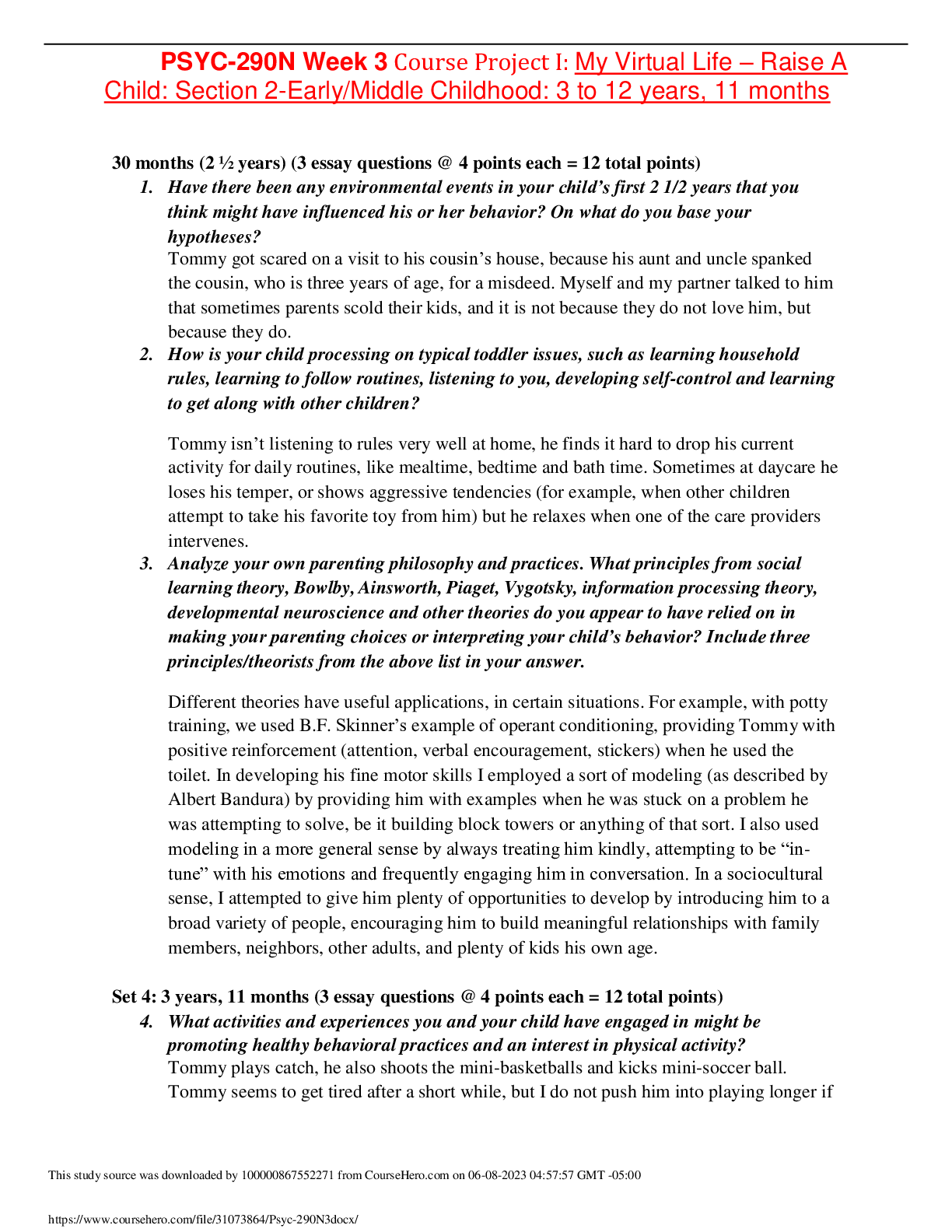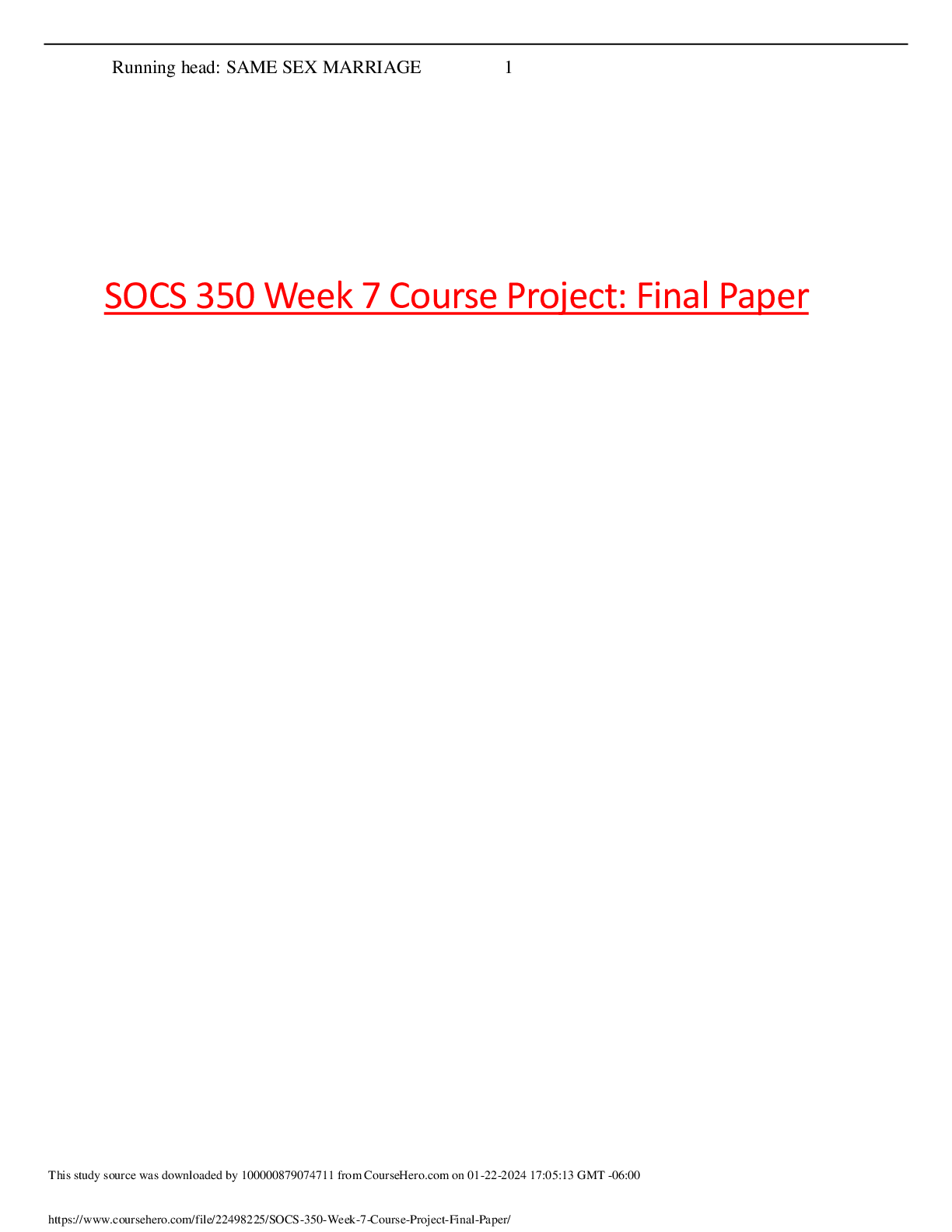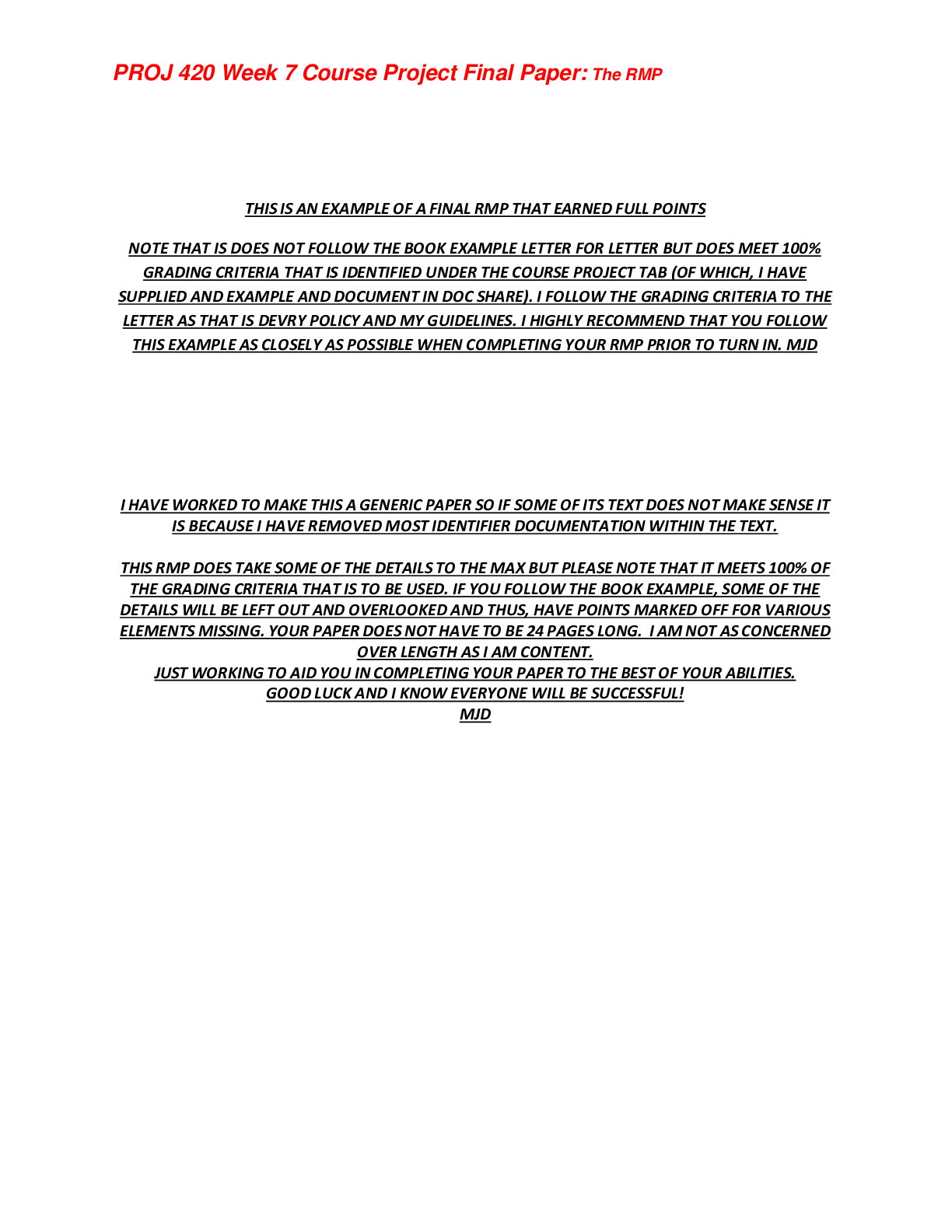Psychology > PROJECT FINAL > PSYC-290N Week 3 Course Project I : My Virtual Life – Raise A Child: Section 2-Early/Middle Childh (All)
PSYC-290N Week 3 Course Project I : My Virtual Life – Raise A Child: Section 2-Early/Middle Childhood: 3 to 12 years, 11 months
Document Content and Description Below
30 months (2 ½ years) (3 essay questions @ 4 points each = 12 total points) 1. Have there been any environmental events in your child’s first 2 1/2 years that you think might have influenced his o ... r her behavior? On what do you base your hypotheses? Tommy got scared on a visit to his cousin’s house, because his aunt and uncle spanked the cousin, who is three years of age, for a misdeed. Myself and my partner talked to him that sometimes parents scold their kids, and it is not because they do not love him, but because they do. 2. How is your child processing on typical toddler issues, such as learning household rules, learning to follow routines, listening to you, developing self-control and learning to get along with other children? Tommy isn’t listening to rules very well at home, he finds it hard to drop his current activity for daily routines, like mealtime, bedtime and bath time. Sometimes at daycare he loses his temper, or shows aggressive tendencies (for example, when other children attempt to take his favorite toy from him) but he relaxes when one of the care providers intervenes. 3. Analyze your own parenting philosophy and practices. What principles from social learning theory, Bowlby, Ainsworth, Piaget, Vygotsky, information processing theory, developmental neuroscience and other theories do you appear to have relied on in making your parenting choices or interpreting your child’s behavior? Include three principles/theorists from the above list in your answer. Different theories have useful applications, in certain situations. For example, with potty training, we used B.F. Skinner’s example of operant conditioning, providing Tommy with positive reinforcement (attention, verbal encouragement, stickers) when he used the toilet. In developing his fine motor skills I employed a sort of modeling (as described by Albert Bandura) by providing him with examples when he was stuck on a problem he was attempting to solve, be it building block towers or anything of that sort. I also used modeling in a more general sense by always treating him kindly, attempting to be “in- tune” with his emotions and frequently engaging him in conversation. In a sociocultural sense, I attempted to give him plenty of opportunities to develop by introducing him to a broad variety of people, encouraging him to build meaningful relationships with family members, neighbors, other adults, and plenty of kids his own age. Set 4: 3 years, 11 months (3 essay questions @ 4 points each = 12 total points) 4. What activities and experiences you and your child have engaged in might be promoting healthy behavioral practices and an interest in physical activity? Tommy plays catch, he also shoots the mini-basketballs and kicks mini-soccer ball. Tommy seems to get tired after a short while, but I do not push him into playing longer if he doesn’t desire. I think it would be a good idea to join Tommy when he demonstrates interest in physical activity and further encourage him in this direction if he seems to have enthusiasm. 5. Describe the development of your child’s language and cognitive skills and discuss how these might be affecting his or her interactions with you & your responses. Tommy communicates well now, relying mostly on complete sentences, and seems to understand most of what I say. He enjoys watching children's educational television and listening to books. He occasionally makes charming errors such as "I runned as fast I can." I expose him to more language as possible, so I spend time reading books to him and making sure he doesn’t miss his educational tv shows. 6. How well is your child adapting to social situations in the home and outside the home? Does your child have any behavior or emotional problems at this point? Why do you think these problems are occurring and what are you doing about them? Tommy is doing pretty good at home, but in preschool he is hesitant to interact with the other children. These days he is afraid of monsters under his bed or in the closet. He has trouble sleeping at night, and even when he does he wants to sleep in my room. Tommy has begun occasionally lying about accidents or rule violations (such as sneaking a cookie before dinner). The lies are lame (e.g., there is a trail of cookie crumbs). I recognize this as a sign of a theory of mind, but I wait until I catch him in the act, explain that lying is wrong, and put him in time-out. For good measure, I also explain that being lied to you makes people feel bad. Set 5: 4 years, 10 months (3 essay questions @ 4 points each = 12 total points) 7. How would you characterize your parenting style? How have your specific parenting techniques changed since infancy? In what ways do you think your parenting style, or any other aspect of your parenting, has been influenced by your cultural background or other experiences? My parenting style has remained authoritative. My parenting techniques changes, as Tommy’s needs varied with every age. I tried to be understanding about his moods, sensitivity, his abilities, and do my best to let him have his own preferences without getting into trouble or danger. I lived with my parents, my brother and aunt growing up. So, there were a lot of expectations from adults. The rigid ones primarily coming from my parents. I do not want Tommy to be in the environment that just has expectations. I believe it is so important for a child to have preferences and choices, and have some independence. I am coming from a culture, where people are very family-oriented. I want Tommy to interact with people outside of her family. Family is important, but I want her to be able to relate with others, and not be concentrated just on family. That’s why I always encourage her to be social and friendly. 8. Describe two specific examples of changes in your child’s behavior at age 4 that seem to stem from growth in cognitive and language ability since the period of infancy (e.g., improvements in symbolic thinking, reasoning, knowledge of the world, and theory of mind). Tommy is talking a lot and is very social at school he is getting along with kids and controlling her temper better. He can also read a few words and write his name. He is excelling in the art and mathematical skills and shape. 9. How would you characterize your child’s personality? Would you say that your child is primarily overcontrolled, under-controlled, or resilient? Support your argument. Although Tommy has demonstrated some aggressive/uncooperative behavior, his personality type is mostly resilient. He can focus on tasks without being distracted. e is friendly and displays mostly positive emotions. He adapts to new situations, and she gets along well with her peers at preschool. I think Tommy’s cognitive abilities and reasoning skills are helping him break out of the overcontrolled and he is realizing he is able to do more and enjoy more if he participates. Set 6: Age 6 years, 11 months (3 essay questions @ 4 points each = 12 total points) 10. How well is your child adapting to social situations in the home and outside the home? Does your child have any behavior or emotional problems at this point? Why do you think these problems are occurring and what are you doing about them? Tommy has been making steady strides toward his school and home socialization. He is falling into line with the emergence of Gender Identity. We've noticed Tommy’s favoritism in the male gender, so his dad has tried to reduce the stereotyping by doing more feminine or androgynous tasks with Sam, like cooking. We have also worked on explaining that both boys and girls can do lots of if not most of the same jobs. We encourage him to play with both boys and girls. Tommy is very well mannered and behaved. Sam does not appear to have any behavioral or emotional problems, other than he is nervous around new situations. We have been trying to combat this ever since we realized his temperament was over controlled. We take him out to parks, museums and zoo's, and have play dates. 11. Do you notice any improvements in cognitive and language skills since age 4? Give specific examples. Does your child have any special needs with regard to cognitive or language development at this point and what do you plan to do? Tommy is becoming more and more efficient in his language abilities, h seems to be improving every time I get a progress report regarding his speaking, reading, and writing skills. For example, Tommy has been reading a lot of books ever since I can remember, whether it was me reading it too him or him being able to read it himself. Tommy is now in first grade and I made the decision to go ahead and buy her some new books that were above her reading level, and now Sky is reading books at a second-grade level. Tommy does not have any problem regarding language or cognitive development. His report all had strength in those areas. 12. Which aspects of your child’s behavior and personality reflect continuities from earlier behavior (e.g., at ages 3-4 years) and which seem to be novel for this age level? Tommy is social, friendly and engaging. His temperament hasn’t changed. He is still quite compliant. His skills of controlling his emotions remained consistent, as well. New things in his behavior are cheating at games. Tommy got serious one day and told me that I am about as “nice” as other parents, but have more rules. The latter mentioned example was a new thing I had never seen in Mary’s behavior. Set 7: age 8 years, 11 months (3 essay questions @ 4 points each = 12 total points) 13. How smart is your child, and in what areas? Think back to the blurb on multiple intelligences that appeared at age 6. Find specific evidence regarding your child's verbal, logical-mathematical, spatial, musical and bodily-kinesthetic intelligence from your observations of your own child as well as the psychologist's report at age 8 years, 11 months. At age 6, Tommy was good in verbal, logical-mathematical, spatial, musical and bodily- kinesthetic. Tommy’s scores were in the average to above average range in word reading, reading fluency, phonological awareness and spelling. So he basically maintained the same ability at age 6, and got better. Tommy's scores on the math concepts, math application problems, and math computation tests were well above average. The psychologist said that he should clearly be placed in 7th grade math, and possibly in a gifted math program, but he recommended further testing. Tommy's scores on tests of visual-spatial ability (spatial rotation, copying of designs, etc.) were well above average, and the examiner recommended that I seek out drawing, design and building experiences for Tommy, depending on interest level. 14. Describe some examples of your child's behavior or thinking that you think are due to typical American gender role socialization and explain why you think so. Several examples can be found at ages 6 and 8. How closely does your attitude toward gender roles correspond to typical American attitudes, and if there is a discrepancy, to what do you attribute this (e.g., cultural background, attitudes of your own parents, etc.)? When Tommy was younger, I always encouraged him to be involved in things without thinking what is “gender appropriate”. American attitudes towards gender role socialization may not be very accurate. Most people think that if a boy/girl is too feminine/masculine, then he/she can turn out to be gay/lesbian later in life. There should be certain limitations, but I think for the most part it is fine to let the child have certain preferences. I believe if there are strict constraints for a girl or a boy in interaction with the opposite sex, they may have difficulties having relationship when they move into adulthood. 15. How might your child's development have been different if she/he was raised by people with a different socioeconomic, ethnic or cultural background? Base your answer on specific evidence of SES/cultural differences from the textbook and class lectures. I believe different factors of life would influence Tommy’s growth differently. For example, it is known that children in the United States are more securely attached to their parents than those in Germany and Japan. If Tommy was raised in a poor nation, she may have not had the proper nourishment to develop normally. Depending on the socioeconomic status of the parents, Tommy, might have not been able to have a good education, be involved in after school activities, or benefit from opportunities such as playing violin or participating in volleyball. I believe the culture of the society (values, ethics, etc) would greatly influence Tommy, as well. If she was born in culture where little kids look after cattle, or spend most of their time doing general labor, it’s hard to imagine that child having any educational aspirations. Set 8: 10 years, 11 months (3 essay questions @ 4 points each = 12 total points) 16. Describe changes in your child’s academic skills between ages 6 and 10 and assess how well these skills are developing. The 5th-grade report card will be useful for this, but you should also incorporate your own observations. What are you doing to help your child? Tommy has done nothing but continuously improve in the academic areas. His current report card stated strengths in reading, spelling, writing, speaking, and listening. Tommy has also been reported having strength in the areas of math, graphical applications, arithmetic computation, art, and music. I have observed that he soaks uo information like a sponge. He can concentrate longer on tasks, and he is continuing to be a strong reader. What I do is read the same books as Tommy and we both talk about the interesting things and funny things we read from the book. 17. How well is your child adapting to social situations in the home and outside the home? Does your child have any behavior or emotional problems at this point? Why do you think these problems are occurring and what are you doing about them? Tommy is adapting well in social situations, he gets along very well with most people and he is popular among the kids, he also has other after school activities that he attends. However, Tommy had a serious fight with his best friend at the beginning of fifth grade and has not made up. He has been moody lately. Tommy is hanging out with a different group of friends at school, and there is some taunting going on between the two sides in the quarrel. His teacher has commented that his classroom behavior has been problematic. At home he is talking a lot about the summer and 6th grade, he is open and a lot more responsible now. 18. Has your parenting changed since the preschool period and if so, why do you think it has changed and what effect might this have on your child? Refer to your textbook or lecture notes for evidence on typical changes in parenting that occur in middle childhood. My parenting style has remained consistent since his preschool. Although, has he became more matured in age, I tend to let go of some things, and making him understand certain things. I still have the authoritative parenting style. It is helping him do better academically and socially. [Show More]
Last updated: 2 years ago
Preview 1 out of 5 pages

Buy this document to get the full access instantly
Instant Download Access after purchase
Buy NowInstant download
We Accept:

Also available in bundle (1)
Click Below to Access Bundle(s)

PSYC 290 - Package Deal Lifespan Development
PSYC 290N Week 1 Quiz – Based Homework PSYC-290N Week 1 Graded Discussion Topic 1 PSYC 290N Week 1 Graded Discussion Topic 2 PSYC-290N Week 2 Course Project I: My Virtual Life – Raise A Child: Sect...
By Doc.Mukai Edyth 2 years ago
$60
18
Reviews( 0 )
$10.00
Can't find what you want? Try our AI powered Search
Document information
Connected school, study & course
About the document
Uploaded On
Jun 08, 2023
Number of pages
5
Written in
All
Additional information
This document has been written for:
Uploaded
Jun 08, 2023
Downloads
0
Views
176

















